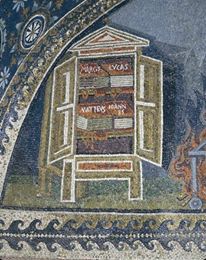10 August OS 2017: Wednesday of the Twelfth Week of St. Matthew; Holy Martyr Lawrence, Archdeacon of Rome
On Monday we began reading from the Gospel According to St. Mark, the shortest and most direct of the four Gospels. St. Mark, the disciple of St. Peter, wrote his Gospel for the Church at Rome, and the terse and concise character of the Gospel corresponds to the old Roman character: sober, no-nonsense, and to the point. St. Mark begins with the preaching of the Forerunner, briefly recounts the Lord’s baptism and temptation in the wilderness, tells of the beginning of Christ’s preaching, the call of the first disciples, preaching in the synagogue in Capernaum, and then (in today’s reading, Mark 1:23-28) His exorcising a possessed man in the synagogue. All in 28 verses, and he has come only midway through Chapter One.
St. Mark’s brevity brings into relief a fact about all the Gospels: They are not biographies of Jesus Christ, but rather a proclamation of Who He is. They contain only what we need to know, to believe, and to do in order to find salvation. We must read and hear these words – literally, physically read and hear them – make an act of faith in their truth, pray for understanding, and resolve to live according to their demands. This must happen day after day, or we forget what a Christian is.
If we have been slack in reading the Gospel lately, this new beginning, with the shortest Gospel, is a good place to start again. We need to open the Gospel, stand or kneel in front of our icons, and read aloud the daily passage or perhaps a whole chapter, going chapter by chapter day by day. Read aloud, at a moderate pace. Struggle for attention. The words of the Gospel are infused with the infinite divine power of the Holy Spirit, and they are self-acting. If we read them with the struggle for attention, they will bring about spiritual fruits.
This actual reading of the Gospel is the most important, first step, and the Holy Spirit will grant us understanding, if we ask for it. If we desire to take another step and study the Gospels as well as read them, we should use a patristic or patristically inspired commentary. Though the commentaries of the ancient Fathers are the most complete, most of us (99% of us?) need something shorter, and the normative short commentary is the explanation of the Gospels by St. Theophylact of Ochrid. This is available in four volumes from Chrysostom Presss in House Springs, Missouri, at https://www.chrysostompress.org/explanation_of_the_new_testament.html Besides, or after, St. Theophylact, the best guide to the Gospels for our time is the commentary by Archbishop Averky, available from Holy Trinity Monastery at http://bookstore.jordanville.org/9781942699002. Just reading a page every day from one or both of these commentaries will change us greatly for the good.
Fr. Seraphim Rose used to ask a good question we should ask about ourselves: “We know we are Orthodox, but are we Christians?” Of course, he did not mean that being Orthodox and being Christian are really two separate things: being Orthodox assumes being a Christian, and to be a Christian in the most accurate sense, to be in the Church, one must be Orthodox. He was using irony to make a point, that one can be taken up with the various aspects of Faith that manifest the Gospel and forget the Gospel itself. If one’s mind is not immersed in the Gospels, and if one is not submitted in obedience to the commandments of the Gospels, then the dogmas, canons, liturgical services, liturgical arts, domestic customs – the various manifestations of Church life – easily become idols, ends in themselves. Our understanding of them becomes fragmented, alienated from their true meaning and their coherence in the light of the Gospel, and instead of using them as instruments for our salvation, we misunderstand and misuse them in such a way that their power – which is indeed great, whether to salvation or damnation – transforms us into Sadducees and Pharisees. Sadducees worship the liturgical cult and the institution. Pharisees worship the rules and practices. Christians worship the Holy Trinity.
Bishop Ignaty Brianchaninov writes in The Arena that we will be judged, both at the particular judgment following death and at the general judgment at the Second Coming, according to the commandments of the Gospel. This judgment determines our fate for all eternity. Let us hasten to make ourselves most intimate with the book by which we most certainly will be judged, and compare to it constantly that book which shall be opened at the judgment, the book of our heart.

